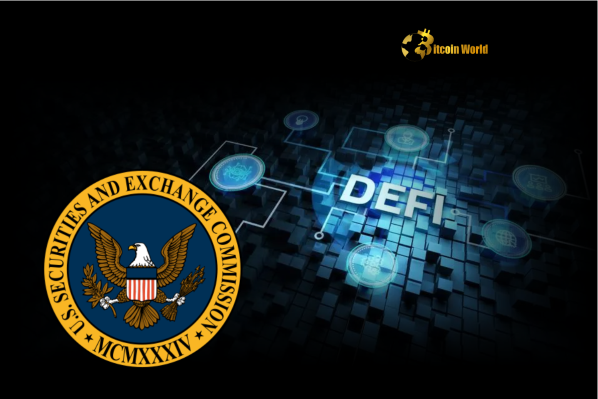BitcoinWorld

DeFi Development Pulls $1B S-3 Registration After SEC Flags Key Omission
In the fast-paced world of cryptocurrency and decentralized finance (DeFi), companies often seek traditional funding avenues to fuel growth and expansion. This is why news regarding a significant player like DeFi Development (formerly known as Janover) pulling a major regulatory filing caught the attention of many in the crypto news sphere. The company recently withdrew its ambitious $1 billion S-3 registration application, a move that raises questions about regulatory readiness and future plans, especially concerning its stated interest in assets like Solana (SOL).
What is an S-3 Registration and Why Did DeFi Development File One?
Before diving into the specifics of the withdrawal, it’s helpful to understand what an S-3 registration is. Think of it as a shortcut for established public companies to register securities with the SEC (U.S. Securities and Exchange Commission). Unlike the more extensive S-1 filing required for initial public offerings (IPOs), an S-3 is available to companies that have been reporting to the SEC for a certain period and meet other eligibility criteria, signifying they are already transparent and compliant.
Filing an S-3 allows a company to quickly raise capital through various offerings, like selling stock or bonds, without needing a brand-new, lengthy filing each time. It signifies a level of maturity and regulatory compliance that makes accessing public markets more efficient.
DeFi Development filing an S-3 indicated its intention to become a more traditional, publicly accessible company, leveraging capital markets for potentially significant funding. A $1 billion registration is a substantial amount, suggesting considerable growth plans. For a company deeply involved in the DeFi and crypto space, this move represented a bridge between the decentralized world and traditional finance, aiming to tap into a broader pool of investors.
The SEC’s Stance: Why Was the Application Deemed Ineligible?
The core reason for DeFi Development withdrawing its S-3 was a determination by the SEC that the application was ineligible. This isn’t a rejection based on the company’s business model or assets like Solana, but rather a finding that the filing itself was incomplete or non-compliant with specific regulatory requirements for the S-3 form.
According to reports, the ineligibility stemmed from the absence of a required internal controls report. The SEC has stringent rules about the financial reporting and internal controls of public companies, designed to protect investors by ensuring the accuracy and reliability of financial statements. For an S-3 to be effective, the filing company must meet all reporting requirements, including demonstrating effective internal controls over financial reporting (ICFR).
The lack of this specific report meant that, in the SEC’s view, DeFi Development did not meet a fundamental prerequisite for using the streamlined S-3 process. It’s a procedural hurdle, but a significant one, highlighting the regulator’s focus on foundational corporate governance and financial reporting standards, even for companies with a digital asset focus.
Understanding the Missing Internal Controls Report
What exactly is this crucial internal controls report? It’s primarily related to Section 302 and 404 of the Sarbanes-Oxley Act (SOX). SOX was enacted after major accounting scandals (like Enron and WorldCom) to improve corporate governance and accountability. Section 302 requires senior officers (CEO and CFO) to certify the accuracy of financial reports and the effectiveness of internal controls. Section 404 requires management and the external auditor to report on the adequacy of the company’s internal control over financial reporting (ICFR).
For a company seeking to use an S-3, demonstrating compliance with these requirements, typically through filed reports and certifications, is essential. The absence of this report suggests that DeFi Development either had not yet established or adequately documented its ICFR to the SEC’s satisfaction, or that the required report was simply not included in the filing package.
This isn’t just a bureaucratic checkbox; strong internal controls are vital for preventing fraud, ensuring financial data integrity, and providing investors with confidence in the company’s reported performance. The SEC’s insistence on this report underscores its role as a guardian of investor protection within regulated markets.
The Solana Connection: How Funds Were Intended for SOL
One particularly interesting detail in the original plan was the intention to use some of the raised funds to purchase Solana (SOL). This highlights DeFi Development’s strategic view of incorporating significant digital asset exposure into its operations or investment strategy. Solana, known for its high throughput and growing ecosystem, is a popular asset within the crypto space.
At the end of May, the company already held a substantial amount: 621,313 Solana tokens. At current market prices, this represents a considerable holding, indicating their existing commitment to the asset. The plan to use a portion of the $1 billion raise for further SOL purchases suggests they saw opportunities for growth or strategic use of Solana within their business model or investment portfolio.
The withdrawal of the S-3 means this specific funding mechanism for acquiring more Solana is now on hold. While the company could potentially use other funds or methods to acquire SOL, the large-scale purchase envisioned through the S-3 raise is delayed until the regulatory hurdles are cleared.
What This Means for DeFi Development and Future Plans
For DeFi Development, the immediate impact is the delay in accessing the public capital markets via the S-3 mechanism. This doesn’t necessarily mean their funding plans are canceled, but the process will take longer.
The company has stated its intention to refile in the future. This means they will need to address the specific issue cited by the SEC – the missing internal controls report. This will likely involve:
- Establishing or strengthening their internal controls over financial reporting.
- Documenting these controls thoroughly.
- Obtaining the necessary certifications and potentially external audits related to ICFR.
- Ensuring all required reports are included in the subsequent filing.
Refiling will require time and resources, potentially pushing back any plans that were contingent on the $1 billion raise, including the significant purchase of Solana. It’s a setback, but one that is potentially fixable if the company can quickly meet the SEC’s requirements.
Navigating the Regulatory Waters: Broader Implications for Crypto News
This incident offers a valuable case study for the broader crypto news landscape and companies operating within it. It underscores the increasing scrutiny that crypto-adjacent businesses face when interacting with traditional financial regulations.
Key takeaways include:
- Regulatory Readiness is Paramount: Companies looking to bridge the gap between crypto and traditional finance must ensure they meet all standard regulatory requirements, not just those specific to digital assets.
- SEC Focus on Fundamentals: The SEC is clearly focused on core financial reporting, governance, and internal controls, regardless of the company’s underlying technology or assets like Solana.
- Procedural Hurdles Can Cause Delays: Even established companies can face significant delays if filings are incomplete or miss required documentation.
- Transparency and Compliance are Key: Building robust internal processes and ensuring transparency in reporting are essential for navigating the regulatory environment successfully.
For investors following crypto news, this event highlights the importance of looking beyond just the digital assets a company holds or plans to acquire (like Solana) and considering the company’s operational and regulatory maturity, especially if they plan to access public markets.
Conclusion: A Temporary Setback or a Warning Sign?
DeFi Development’s withdrawal of its $1 billion S-3 registration is undoubtedly a setback, primarily due to a procedural issue flagged by the SEC regarding internal controls. While the company plans to refile, the incident delays its access to significant capital and its plans to acquire more Solana.
This event serves as a clear reminder that companies operating at the intersection of crypto and traditional finance must adhere strictly to established regulatory frameworks. The SEC’s focus on fundamental requirements like internal controls signals that regulatory compliance is not a minor detail but a foundational necessity for accessing U.S. public markets. The crypto industry continues to evolve, and successful navigation will increasingly depend on robust corporate governance and a deep understanding of, and compliance with, existing financial regulations.
To learn more about the latest crypto regulation trends, explore our article on key developments shaping SEC actions and institutional adoption.
This post DeFi Development Pulls $1B S-3 Registration After SEC Flags Key Omission first appeared on BitcoinWorld and is written by Editorial Team





